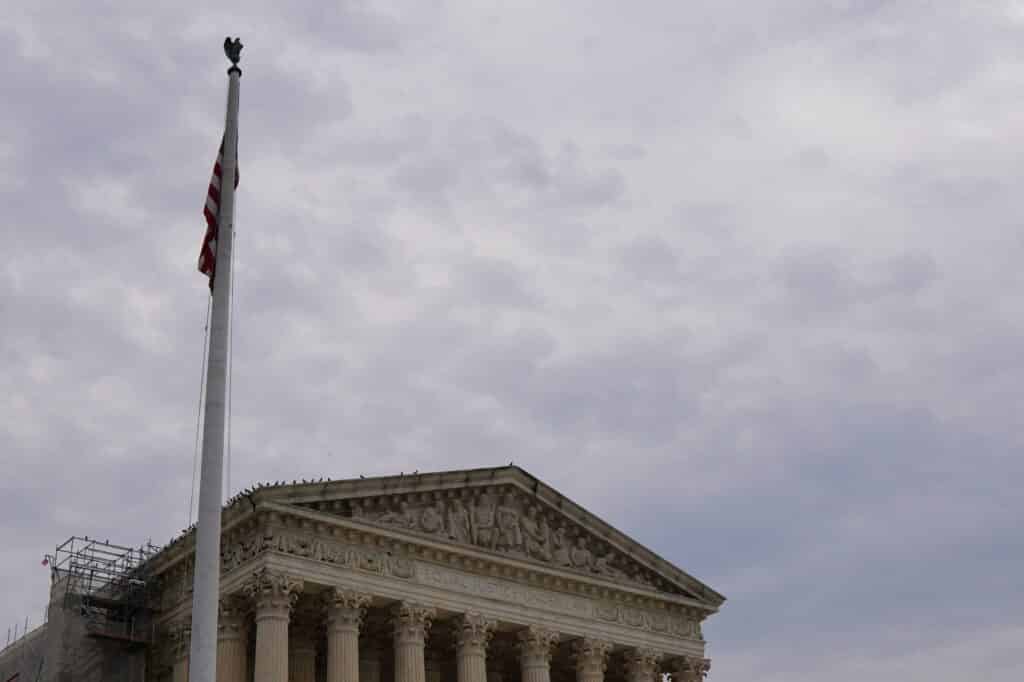This week, we saw another lower court respond to a post-Rahimi remand from the Supreme Court by handing down… the exact same decision it did before. I take a look at the three cases this has happened in, and analyze what the Supreme Court might be trying to accomplish.
Contributing Writer Jake Fogleman delves into the Maine race that could determine control of the House. It’s one at the center of the worst shooting in the state’s history and one where gun policy is a top priority. Can Congressman Golden survive after switching sides on “assault weapons” bans? The answer will probably inform our gun politics for the foreseeable future.
Plus, Hot Air’s Ed Morrissey joins the podcast to talk about the gun money race as we head down the homestretch.

Analysis: Rahimi Makes Zero Impact… Again [Member Exclusive]
By Stephen Gutowski
The Supreme Court keeps remanding Second Amendment cases for reconsideration under Rahimi, and the lower courts keep sending them back unchanged. What is going on?
On Thursday, a Second Circuit panel became the third appeals court to revisit a gun case the High Court granted, vacated, and remanded (GVR). They were also the third to return with the same decision as before. Rahimi didn’t change a thing in any of them.
In Antonyuk v. James, the panel unanimously reaffirmed themselves.
“Having reconsidered the prior decision in light of Rahimi, and the parties’ supplemental briefing regarding the effect of that decision on our reasoning in this case, we now issue a revised opinion in Antonyuk,” the panel wrote. “We reach the same conclusions that we reached in our prior consolidated opinion.”
In late August, an Eighth Circuit panel did the same.
“We begin with the Second Amendment challenge, which is back before us on
remand after United States v. Rahimi,” the panel wrote in US v. Doss. “In Doss’s view, the federal statute criminalizing possession of firearms by felons, 18 U.S.C. § 922(g)(1), is unconstitutional after New York State Rifle & Pistol Ass’n v. Bruen, both on its face and as applied to him. We have already rejected this argument in two recent cases. Together, they spell the end for Doss’s constitutional challenge.”
A few weeks before that, a different Eighth Circuit panel started the trend.
“The case is now on remand from the Supreme Court for further considerationin light of United States v. Rahimi. Rahimi held that 18U.S.C. § 922(g)(8), the federal prohibition on possession of a firearm while subject to a domestic violence restraining order, is constitutional on its face,” the panel wrote in US v. Jackson. “Rahimi does not change our conclusion in this appeal, and we again affirm the judgment of the district court.”
All three of them denied challenges to gun laws. Two of them expounded on why they thought Rahimi reinforced their initial rulings.
In Doss, the panel saw a parallel between Rahimi‘s violent history and Doss‘s background that they argued would doom his case even if it were considered under a lower, as-applied standard.
“Even if he could bring an as-applied challenge, he would not succeed,” the panel wrote. “His lengthy criminal record includes over 20 convictions, many of them violent. It is safe to say that Doss’ pose[s] a credible threat to the physical safety of others.'”
The Antonyuk court went further and tried pinpointing a broader principle from Rahimi.
“[R]ahimi strongly suggests that what matters in the search for historical antecedents of modern firearms regulations is the substance of the regulation, rather than the form,” it said.
That may be a reasonable takeaway from Rahimi, but it isn’t much more specific than or different from the same court’s takeaway from Bruen. Even in cases that haven’t been GVRd, lower courts don’t seem to be coming out much differently than before Rahimi was handed down. So, it may strike some as odd that the Court keeps doing this with every Second Amendment case.
There are a few reasons the Court may be going this route.
The easiest and, perhaps, likeliest explanation is the Court just doesn’t want to get ahead of itself. It doesn’t want to settle more Second Amendment cases until its ruling in Rahimi has percolated through the lower courts. It may want to ensure any case it takes has already seen all of its precedents incorporated into it, with a fully developed record that includes whatever insights the lower courts have to offer.
The other possibility is that the High Court thinks Rahimi is more significant than the lower courts seem to believe. It may be GVRing all these cases with the expectation they’ll come back with different results or, at least, different reasoning. Maybe the justices are unhappy with how little insight the lower courts see in their latest Second Amendment ruling.
It’s impossible to say for sure since the High Court hasn’t said much of anything about why it’s issuing these GVRs. In fact, it just issued another this week.
If the Supreme Court is merely trying to keep its docket tidy, then the only Second Amendment cases with any realistic chance of being heard are the ones that have already taken Rahimi into account. Given the narrow nature of the ruling and how lower courts have reacted to it thus far, that would probably just result in a bit of a delay as activists shift to pushing post-Rahimi test cases to the forefront.
If the Court is using these GVRs to send a message that it doesn’t think lower courts are reading enough into Rahimi, it will probably eventually take up one of those cases in order to make themselves clearer. That could happen sooner rather than later now that there are a few options to choose from on that front.
For now, things may continue on this way for a while. Expect more GVRs from the Supreme Court and more shrugs from the lower courts.
Podcast: Hot Air’s Ed Morrissey on the Gun Money Race as the Finish Line Approaches [Member Early Access]
By Stephen Gutowski
This week, we’re discussing the final fundraising numbers we’re going to see from the gun groups ahead of the election.
To do that, we’ve got Hot Air’s Ed Morrissey back on the show. He said he isn’t surprised to see the gun-control groups outraising the NRA and its allies. He argued it would probably take several more cycles for former NRA donors to be comfortable enough to give to the movement again.
He was skeptical the money advantage will translate to a big electoral advantage at the end of the day, especially in the highest profile races. And he said gun-control ads leaning on abortion issues, while potentially understandable, is a sign the groups don’t think gun control is a top priority. Although, he also said the ability of the gun-control groups to spend big in local and state races could have a significant impact.
He also gave his view of the effectiveness of Kamala Harris and Donald Trump’s gun messaging in 2024, which was different from the views outlined by our previous guests, David French and Tim Miller. While neither Ed nor I make endorsements of candidates, we did briefly discuss our differing views of the dangers of either candidate.
You can listen to the show on your favorite podcasting app or by clicking here. Video of the episode is available on our YouTube channel. An auto-generated transcript is here. Reload Members get access on Sunday, as always. Everyone else can listen on Monday.
A free 30-day trial of The Dispatch is available here.
Plus, Contributing writer Jake Fogleman and I cover a pair of resurfaced clips from Kamala Harris’ tenure as San Francisco DA that show her taking a more pragmatic view of the Second Amendment and school security policy. We also discuss how party control of the House of Representatives next year could come down to a race in Maine where an incumbent Democrat’s new support for an assault weapon ban could cost him his seat. We finish the show with a round-up of stories dealing with an investigation into gunmakers sharing gun owners’ private data with political operatives, a Democratic Senate candidate’s range day campaign event going awry, and how the Second Circuit has again ruled on New York’s concealed carry restrictions.

Analysis: The Key Race Where Guns Could Play a Decisive Role [Member Exclusive]
By Jake Fogleman
Despite plenty of fertile ground for candidates to exploit the issue, gun politics has been mostly an afterthought in this year’s presidential contest. In one critical congressional race, however, it could help make the difference in who controls the House after November.
Maine Congressman Jared Golden (D.) is locked in a highly competitive bid for re-election against Republican challenger and former NASCAR driver Austin Theriault in Maine’s Second Congressional District. The seat, seen by leaders of both parties as essential to their hopes of holding majority control of the chamber next year, has predictably attracted a raft of outside attention from groups looking to sway the outcome. One of the most potent and consistent lines of attack from those hoping to flip the seat: Golden’s recent shift in favor of an “assault weapon” ban.
“The Washington liberals changed Jared Golden,” an attack ad from the conservative Restoration PAC begins. “Congressman Golden now supports Biden’s radical gun control agenda. That’s why Golden is F-rated by Gun Owners of Maine. Jared Golden won’t protect our Second Amendment rights. He’s with Biden and Kamala now.”
“Jared Golden’s biggest lie? ‘I’m a straight shooter,’” another TV ad from the National Republican Congressional Committee states. “But Golden wasn’t straight with us. Golden reversed his position on gun control. Jared Golden flipped. Golden now supports a ban on the most commonly held rifle in the US. Golden’s turned into another Washington politician. Golden’s even backing the liberal’s plan for a gun registry. Jared Golden is not one of us.”
While such ads may seem like standard fare for gun-rights-supporting conservatives looking to tar a Democrat, there’s reason to think the attacks will be more potent than usual in this race.
Golden, a self-styled “Blue Dog” Democrat and former Marine, has been something of an oddity in our modern politics throughout his time in Congress. He unseated an incumbent Republican in 2018 and held it ever since despite Donald Trump beating Joe Biden by nearly eight points there in 2020.
Reflecting the district’s conservative-lean and strong gun culture, Golden often bucked his party on Second Amendment issues. Particularly from 2018 to 2022, when Democrats controlled the House, he frequently stood as one of the few or even only “No” votes on gun-control proposals, including new age restrictions, “ghost gun” bans, ammunition magazine bans, and an assault weapon ban. He even boasted a “B-rating” from the NRA, unusually high marks for the group to give a Democrat in recent years.
However, the district is also home to the town of Lewiston. Following last October’s massacre there, Golden publicly voiced support for an “assault weapon” ban for the first time in his career.
“Because of a false confidence that our community was above this and that we could be in full control, among many other misjudgments, I have opposed efforts to ban deadly weapons of war like the assault weapon used to carry out this crime,” Golden said at the time. “The time has now come for me to take responsibility for this failure, which is why I now call on the United States Congress to ban assault rifles like the one used by the sick perpetrator of this mass killing.”
Since that pivot, Golden now sports an “F-rating” from the NRA, and the group has endorsed his challenger. And now that he’s facing a difficult re-election bid, it’s clear that his change of heart has turned into a cause for concern over his standing with gun voters in Maine.
Last month, his campaign spun up a new coalition of outdoorsmen dubbed “Sportsmen for Golden” meant to emphasize his bona fides among hunters and gun owners and blunt some of the attacks he’s faced from gun-rights advocates. He also cut a campaign ad with Craig Poulin, a retired chief of the Maine State Police, playing up his commitment to gun rights and law enforcement.
“Jared is a Maine sportsman and gun owner who respects and supports the Second Amendment, and he opposes unnecessary and unhelpful gun legislation,” the retired chief says in the ad over background footage of Golden firing a bolt-action rifle.
He also continues to publicly oppose some gun-control measures, like a three-day waiting period or “expanding background checks,” according to the Portsmouth Herald.
It’s unclear yet how much damage the attack ads pointing to Golden’s assault weapon ban about-face have done or how much he’s been able to blunt those attacks with his own pro-gun messaging. Polling in the race has been sparse, but the few conducted so far have shown Golden tied with his challenger or narrowly trailing.
Golden’s campaign has thus far outraised Theriault’s, but outside groups opposing him have far outspent the incumbent. Restoration PAC, the group behind the previously mentioned ad, has been the single largest outside spender in the race thus far, shelling out more than $3.1 million to oppose Golden. The NRCC has also spent $1.9 million. Meanwhile, even in its beleaguered state, the NRA is also investing in the campaign to unseat him. The group has spent $57,019 in support of Theriault and another $50,000 opposing Golden, more than it has invested in any other House race, according to OpenSecrets.
Golden’s seat may not literally be the dividing line between Republican and Democratic control of the House. Moderate-leaning swing districts in the House tend to all break the same way based on whichever party the macro-political environment favors in a given election. But with how closely divided the House has been between the two parties in recent years, it isn’t unreasonable to think that Golden’s seat will be one of a tiny handful that ultimately decides whether the chamber remains in GOP hands. That’s particularly true given that current polling suggests that party control of the House is essentially a coin flip.
The outcome of the race in Maine’s Second Congressional District will be an interesting test case for how potent gun politics can still be in 2024 and whether gun-rights voters can still mobilize to exact an electoral toll from politicians perceived to have crossed them as they once did en masse. Whichever way the election goes, it will probably determine how each side views the political potency of gun policy.
That’s it for now.
I’ll talk to you all again soon.
Thanks,
Stephen Gutowski
Founder
The Reload







